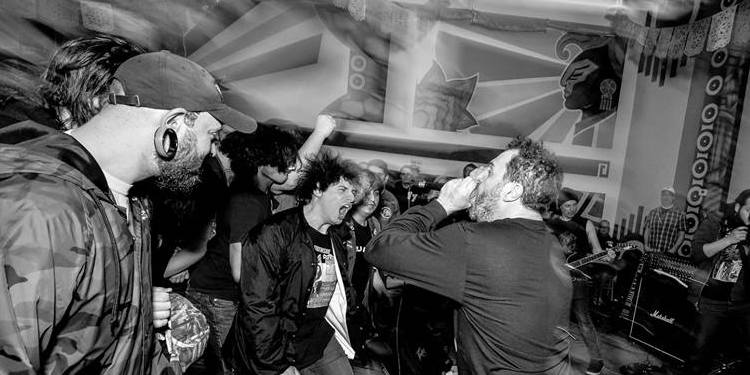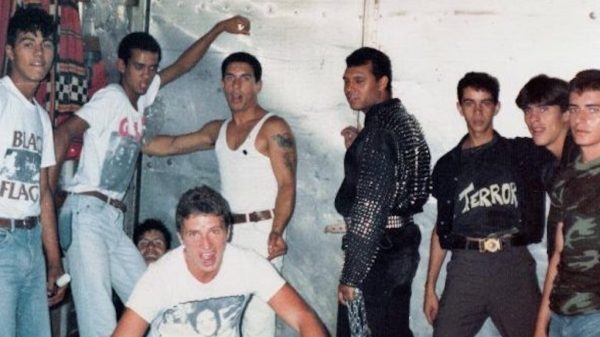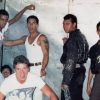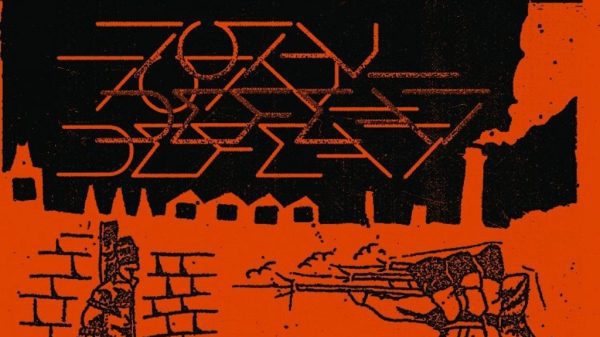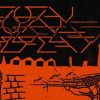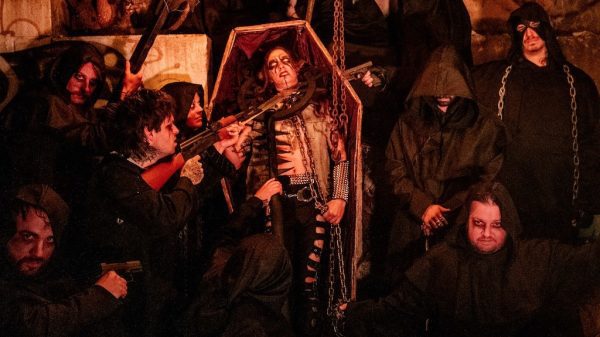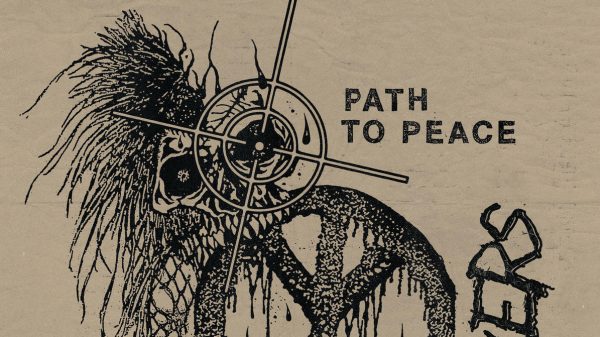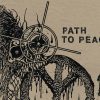Some 20 plus years ago I first caught wind of a group of Chicago kids cranking out not only some of the most pummeling powerviolence/grind, but the spirit of actual confrontation and true activism to boot. RACETRAITOR, a name that immediately conjures up a certain demographic, unleashed onto the mid-90s hardcore punk scene a fury of socio-political anthems that both inspired and bewildered. Shows were often times thwarted into full on debates and arguement, as those who had never encompassed their position in the class system were stunned by the uncompromising ethos of RACETRAITOR.
Fast forward to current day… the band have reunited, are releasing and writing new material and touring. Not so much riding the reunion band coattails, but moreso still walking the talk, a call to arms. Crying out in desperate times with raised fist, as the nation that we live in crumbles further into the darkness that’s always been there, now more blatantly and dangerous. I had the pleasure of speaking with Mani Mostofi and Brent Decker on the resurrection and history of the band, the plight of mass incarceration in America and Cvlt Nation has the exclusive premiere of the music video for the song “Damaged”…
Talk about “Damaged” as a song.
MM: “Damaged” is one of the first songs we ever wrote. So it captures powerviolence-era Racetraitor, pretty well. We always loved it because how straightforward and angry it was. The song is at least 22 years old. We wrote it about mass incarceration and racial disparities. And about profiting of jaling bodies and the devastation of black and brown communities. Back in 1996 all the talk was about increased incarceration. We had the horrible Clinton Crime Law. More policing, increasing sentencing, more private prisons. The crime epidemic and fear of it was on loop in the media. That is how you got elected to office in the 1990s. It was always code for fear of black people. When we got back together we just thought that song had a place in our set. I part because it is lyrically still relevant but also because 22 years later the trend is potentially reversing itself as a result of greater awareness. Now there is open mainstream discussion about the evils of mass incarceration, which is amazing. Still, there is too much interest in keeping the system in place, so it is worth singing about as aggressively as we can.
Where did the idea for the video and the slavery analogy come from?
BD: As a band, it is kind hard for us to think of music videos that make sense for us. We are not the type of band that can shoot a video of us solely playing in a dark warehouse or abandoned hospital. We needed something that would bring to life what we do. So the idea came from a few places, but was largely influenced by Michelle Alexander, the author of the book The New Jim Crow. She really lays out how the criminal justice system for black people in the US can be traced from slavery to segregation to today’s prisons.
MM: The comparison with slavery is something a lot of people have made over the years, but it more than an argumentative tool. Prisons are the only venue of legal slavery under the US Constitution today. There is corporate profit coming from basically free prison labor. There is also the idea of corporate profit by depriving black people and people of color their liberty. There is the way mass incarceration attacks the fabric of the family. And of course, there is the racism that underpins it all. The video tries to capture all of that.
How did Simon Ampel get involved?
MM: I had worked with Simon before on a music video about Iran’s Green Movement. We actually won first place in an Iranian short film festival for that video and I love his style. So when I saw that he actually animated a video for High on Fire, I thought we should reach out to him. Politically, I knew Simon was on the same page as us. So we had Simon in mind before we had a song picked out or a concept. When I talked to Simon about the idea for “Damaged” he insisted on doing it. He did an amazing job and says it is one of his favorite projects to date.
When I did the Iran video with Simon, I was pretty impressed at how well he told an Iranian visual story without being Iranian. But the difference there was several Iranians were involved in the telling of that story or at least making sure Simon’s take was relatively true and politically sound. Besides Michelle Alexander’s voice in out heads, however, this was really a story about black history without black storytellers. That is not very cool, but it is also the awkward place you put yourself when you are a band called Racetraitor. The metal and hardcore scenes love the aesthetics of violence and that can be fun. But our goal wasn’t to make another ‘brutal’ video. The first ‘cut’ felt a little like that for me. So we checked in with a good number of black artists and activists at various stages. We folded in their input and critiques and made some key changes. We tried pretty hard to show the human side of the story, the families, and liberation movements people of color have led all these years. Keep in mind, the song was only 30 seconds long, so there are limits. But in the end we had a good amount of positive feedback and we felt we came pretty close to the tone we set out to achieve.
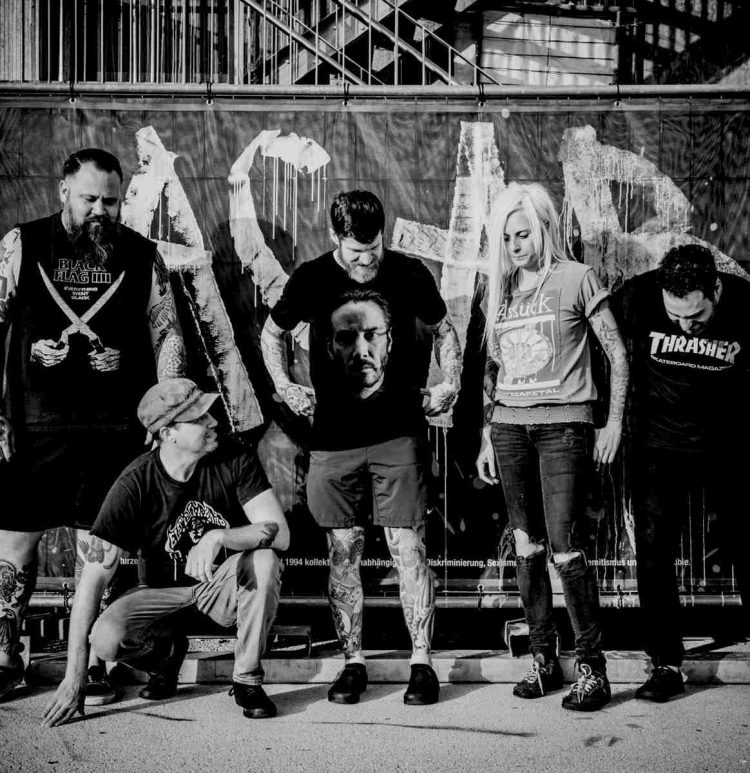
So now that it is 22 years down the road, is the current lineup the original members or have we brought in some new blood?
BD: The ideological core of the band has really been the same since the beginning. Dan, Mani, Andy, and myself have all known each other for decades. The only core person missing is Karl Hlavinka. Dan, Mani, and I all went to Junior High together. We have also had different members over the years who we all love and respect. For us, RACETRAITOR has been as much about a group of friends growing together as it has been us trying our best to resist the institutions of this capitalist death culture. As we have gotten older, that has manifested itself in many different ways, but the band serving as a small act of cultural resistance has always been the same. As we started to really play shows again, we asked Andrea Black to join the band. She is an off the grid OG hardcore kid who comes from the same scene as us. All the points of reference sonically and ideologically are the same. Because of Andy’s tour schedule we also sometimes have Gabe play drums with us-who again holds similar set of political beliefs and is a really dedicated anti-racists activist.
Explain what brought you guys together back in the 90s and if any of those same elements or ideals inspired the resurrection.
BD: Unfortunately, the reasons for this band coming together initially and again in 2016 are the same. I mean, when we were talking about mass incarceration or US foreign policy in Latin America or the Middle East in the 1990s, they were less widely understood than they are now, but those topics remain as important as ever. I think as we were watching the conversations around the last election cycle, we all personally needed some sort of artistic outlet. We were inspired by the resistance of Black Lives Matter, Standing Rock etc. and felt that we could add to the conversation in our community of hardcore, punk, and metal.
MM: For me, it is important to be active in your community. Meaning for better or worse, the members of RACETRAITOR are part of the global hardcore, punk, and metal community. We all individually identify with different cultural, political, professional communities outside of the band, but end of the day we feel a responsibility to be part of the cultural resistance in this community. Additionally the alt-right is currently targeting many of the people who are in the punk, hardcore, and metal community (angry, disaffected young people) and we all have a responsibility to ensure that shit gets stomped out.
You’ve been known for confrontational live performances over the years. Any stand out examples of this?
BD: I mean there are million stories, none that worthy of talking about. The approach this time around has been much more about community building than calling people “crackers.” I mean there is too much going on in the world and too much at stake to fight within the scene.
MM: White kids at our shows are actually bummed we are not calling them or anyone crackers. Odd world we live in these days. We used that word to start a conversation, it wasn’t some type of fetish sport (laughing). I think we have people’s attention, so we downplay the gimmicks.
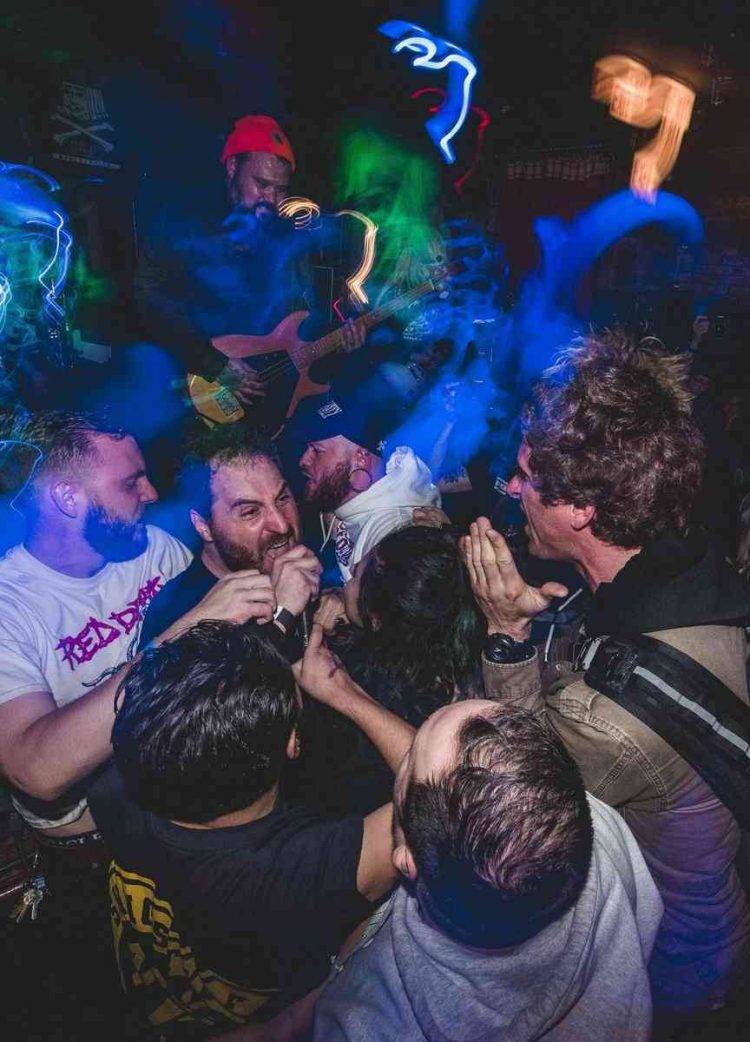
Dan Patrick
What are you all involved in outside of the band platform, or side projects, etc?
BD: Part of why I think we are somewhat still relevant as a band is because we as individuals have dedicated the last 20 years to political and social activism in our personal and professional lives. Not by any means perfectly, there have been many many missteps, but it has been a constant push and growing process. I work in public health and community based violence prevention, Mani works in human rights with a focus on the Middle East region, Dan is a clinical social worker and activist, Andy uses his platform as member of Fall Out Boy to publicly and privately support many organizations, movements, and causes, and Andrea is involved in all sorts of sustainable agricultural/environmental issues.
MM: Exactly, this is not the type of band you can do if you are not trying, often failing but trying, to embody the ideals. We would feel like idiots going through the motions. One of our biggest influences is 90s hip hop including Arrested Development and Public Enemy. And one things both those groups had that I think was missing from much of punk was direct calls for activism. And that is what we are about. So if we don’t make the effort ourselves what is the point.
How has Invisible Battles Against Invisible Fortresses and the band itself been received since reuniting?
BD: The reception to RACETRAITOR being a band again has been unbelievable and inspiring. I don’t think any of us expected the reception and support we have received. People are stoked and we keep getting put on shows, fests, etc. and its always about having the issues we talk about be in the room. People like Shane from Empire Productions and The Rumble, Joe and Chris from This Is Hardcore, Josh from State of Mind, and the guys from United Blood have all put us on shows that many people might question, but again it’s about having these ideas in room during this increasingly insane time in the world. Also Sunny from Hate5six has really been supportive and through his website the conversations from the shows have reached far beyond the people who were physically there.
MM: We are by no means a legacy band that gets together with the massive built-in fanbase. We are working to get visibility like everyone else. But what we are is a tiny bit of cultural resistance at and time when people need to feel like more needs to be done. And so new music that is about today is part of it and Invisible Battles seems to have won some people over to our side.
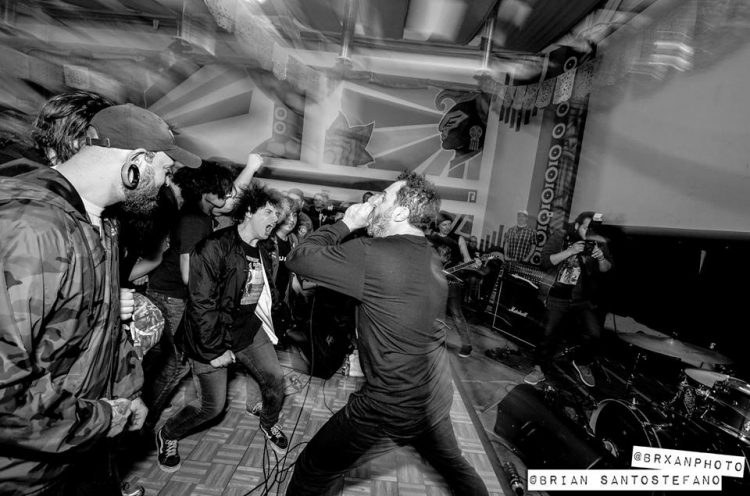
What does the future hold for this incarnation of the band?
BD: We will be releasing our second full length in the fall which we are really stoked on. We are working on a bunch of shows and a few projects outside of the US.
What would you say is the biggest issue concerning the country and/or the world currently?
BD: That is a difficult question to answer- I think that really depends on your perspective. As I said before, as a band we are lyrically focused on issues around US foreign policy in Latin America and the Middle East, mass incarceration, immigration, and the historical context of the current administration.
MM: Certainly to global rise of the far right is a big concern. It is not just the US but UK, Poland, Hungary, India, the Philipese. There are dozens more I could rattle off the top of my head. These are angry xenophobic and racist movements with a reverence for violence at their core. So the threat is big. It is really the failures post-cold war consensus on neoliberalism and US power which both failed in the 2008 crisis and the Iraq War. Of course when the Emperor is exposed as having no close, opportunists can exploit the moment for political gain. That is a big concern to me and climate change is really the biggest threat we are facing but it is a political crisis more than environmental and the rise of the far right just makes it worse. Still we are hopeful people will stand up and meet the challenges we face.
How important is religion or spirituality within your lives?
BD: I think as a group of people we all have different perspectives on spirituality ranging from members coming from more traditional Muslim families to weirdo mysticism to full on atheism. I think all of us are extremely critical of the institutions of all belief systems (spiritual or otherwise), but like with any grouping of humans, there can be community to be found within which is not based on oppression. Something we need to be mindful of as a community, who are largely and rightfully against religion, is the atheism pushed by the likes of Sam Harris is really just white supremacy dressed in nicer clothes. I mean the basis for the scientific method and many of the great advances in philosophy, medicine, arts, etc come from what is considered the Muslim world. His whole islamophobic perspective only serves to further define the “other” who becomes easier to bomb, create insane immigration policies against, and serve the capitalist interests in the region. Fuck that dude 100%.
Discuss the danger of the current platform running the U.S.
MM: There is so much going on that it can be overwhelming. You have the general feeling of permissiveness Trump has signaled, whether it is a rise in hate crimes to US’s allies feeling at liberty to use violence against civilian protesters, to you have ICE running around and acting like it above the law detaining people at will.
BD: Right now in the US I think the Trump administration has brought a lot of issues up, but more than anything he is a mirror. He is the reflection of all US domestic and foreign policy which has been built upon the oppression of the many for the benefit of the few since the very beginning. From George Washington to Barack Obama, people have suffered here and around the world because of our governments actions. Don’t get me wrong I voted for Obama, he is in fact probably the best president we will have in our lifetime and he is a war criminal. We need to smash this mirror and build a better system in the US. I think now more than ever people are trying to do that and hopefully we can create a different world.
Any last words or shout outs?
BD: Thanks for the interview.
MM: Keep your head up.
Site: https://www.facebook.com/racetraitor.hc/
https://racetraitor-hc.bandcamp.com/

